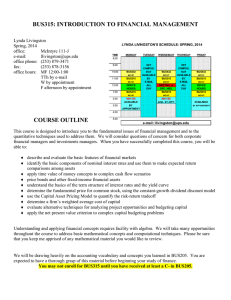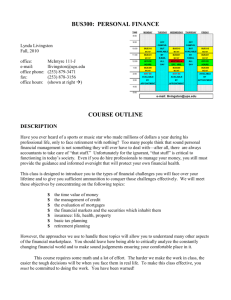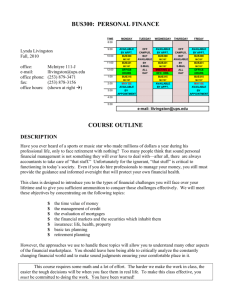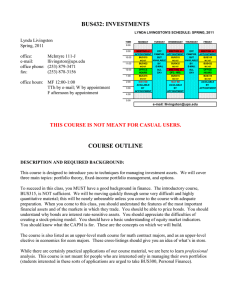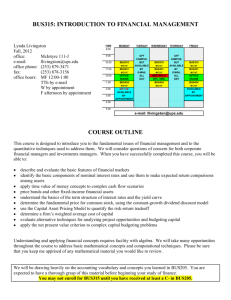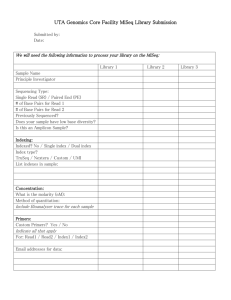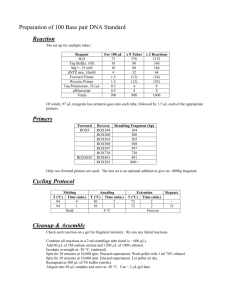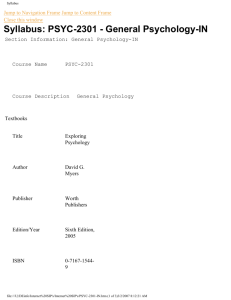Lynda Livingston - University of Puget Sound
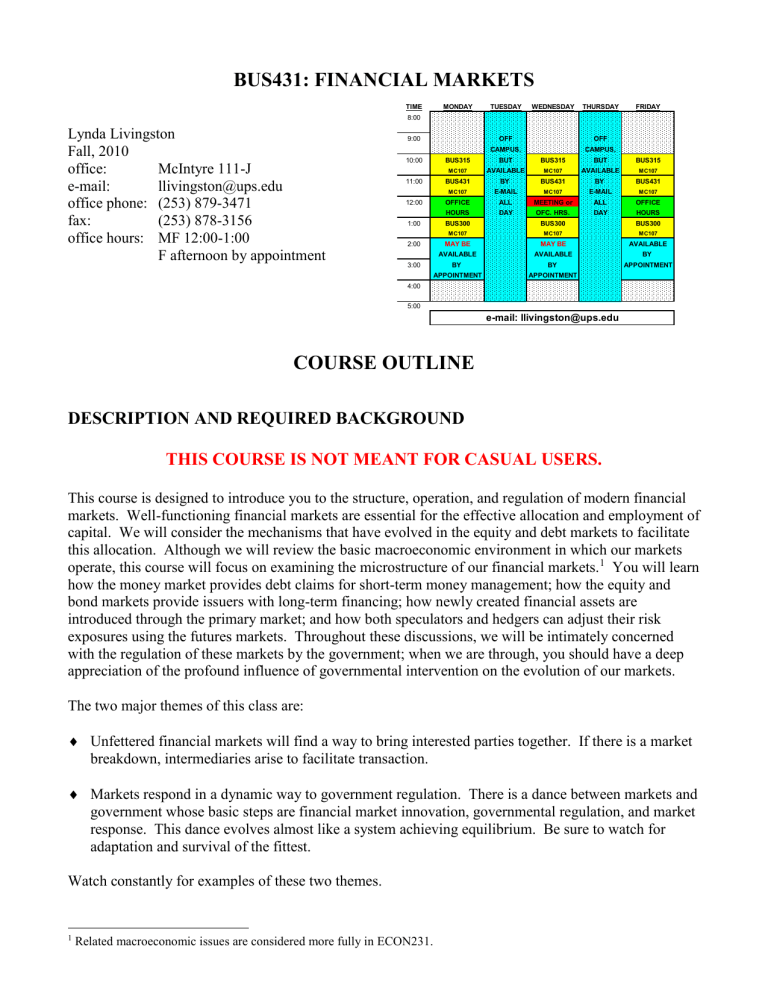
BUS431: FINANCIAL MARKETS
Lynda Livingston
Fall, 2010 office: McIntyre 111-J e-mail: llivingston@ups.edu
TIME
8:00
9:00
10:00
11:00
MONDAY
BUS315
MC107
BUS431
MC107
TUESDAY WEDNESDAY THURSDAY
OFF
CAMPUS,
BUT
AVAILABLE
BY
BUS315
MC107
BUS431
MC107
OFF
CAMPUS,
BUT
AVAILABLE
BY
E-MAIL office phone: (253) 879-3471 fax: (253) 878-3156 office hours: MF 12:00-1:00
F afternoon by appointment
12:00
1:00
2:00
3:00
OFFICE
HOURS
BUS300
MC107
MAY BE
AVAILABLE
BY
ALL
DAY
MEETING or
OFC. HRS.
BUS300
MC107
MAY BE
AVAILABLE
BY
ALL
DAY
APPOINTMENT APPOINTMENT
4:00
5:00 e-mail: llivingston@ups.edu
FRIDAY
BUS315
MC107
BUS431
MC107
OFFICE
HOURS
BUS300
MC107
AVAILABLE
BY
APPOINTMENT
COURSE OUTLINE
DESCRIPTION AND REQUIRED BACKGROUND
THIS COURSE IS NOT MEANT FOR CASUAL USERS.
This course is designed to introduce you to the structure, operation, and regulation of modern financial markets. Well-functioning financial markets are essential for the effective allocation and employment of capital. We will consider the mechanisms that have evolved in the equity and debt markets to facilitate this allocation. Although we will review the basic macroeconomic environment in which our markets operate, this course will focus on examining the microstructure of our financial markets.
1
You will learn how the money market provides debt claims for short-term money management; how the equity and bond markets provide issuers with long-term financing; how newly created financial assets are introduced through the primary market; and how both speculators and hedgers can adjust their risk exposures using the futures markets. Throughout these discussions, we will be intimately concerned with the regulation of these markets by the government; when we are through, you should have a deep appreciation of the profound influence of governmental intervention on the evolution of our markets.
The two major themes of this class are:
Unfettered financial markets will find a way to bring interested parties together. If there is a market breakdown, intermediaries arise to facilitate transaction.
Markets respond in a dynamic way to government regulation. There is a dance between markets and government whose basic steps are financial market innovation, governmental regulation, and market response. This dance evolves almost like a system achieving equilibrium. Be sure to watch for adaptation and survival of the fittest.
Watch constantly for examples of these two themes.
1 Related macroeconomic issues are considered more fully in ECON231.
TTh by e-mail; W by appointment
BUS431/FALL, 2010/SYLLABUS 2
DESCRIPTION AND BACKGROUND, continued
This is a survey course. It is qualitative, and provides the “breadth” dimension of the two-course senior sequence in finance. (The companion course, BUS432:
Investments, provides the “depth.”) Since this is a survey, we will cover a broad variety of topics; one of your challenges will be to develop a sense of “place” for each topic, and to work actively to define links among topics.
The course is not all about scope, however, and we will dig fairly deeply into several topics. Expect these in-depth studies to be challenging—this is a senior-level course.
You are expected to be thoroughly familiar with time value of money concepts and with the bond pricing model. You can find a very basic review of these ideas in the “time value” and “bonds” primers in the 315 section of my webpage. This alone, however, is insufficient for our needs . Please let me know if you feel overly “rusty” about these fundamentals, and I will be happy to provide you with some resource materials.
OBJECTIVES
After successfully completing this course, you should understand the basics of the capital markets for both debt and equity.
Specific objectives of this course are to help you understand:
the pricing conventions in the money market
characteristics of money market assets; unique features of specific money market assets; how to use money market assets to finance a debt portfolio
underwriting
theories about the underpricing of IPOs
other primary market approaches: auctions, rights
characteristics of assets in the capital markets for debt
the mechanics of the secondary markets for equity
REQUIRED COURSE MATERIALS
1.
TEXT
Fabozzi, Modigliani, Jones, and Ferri, Foundations of Financial Markets and Institutions, a recent edition, Prentice Hall.
You do not need the most recent edition, which will cost too much. Try the most recent obsolete edition.
more
BUS431/FALL, 2010/SYLLABUS 3
REQUIRED COURSE MATERIALS, continued
2.
PRIMERS
For each topic, you will receive a “primer.” This is a set of notes that I have written to accompany the topic. It usually includes example homework problems, with answers. I WILL E-MAIL THESE TO
YOU AS WE GET TO OUR NEW TOPICS. Use these primers to help you with your homework! Use these primer to help you navigate our course topics! Use these primers as your main textbook for the course!
The primers can’t help you if you don’t read them. I expect you to read the primers—that’s why I wrote them! If you have questions about the material in the primers, please ask.
Having trouble keeping up with your primers? Think we have a lot of course materials?
GET A BINDER.
2
3.
HANDOUTS TO ACCOMPANY PRIMERS
For each primer, there may be an associated handout. This is material that may be difficult to package in electronic form; hence, it is instead presented as a handout. Treat this material as addenda to your primers. I will attempt to keep such material to a minimum.
Having trouble keeping up with the handouts associated with the primers?
Think we have a lot of course materials?
GET A BINDER.
4.
THE WALL STREET JOURNAL
This is the real-world’s finance textbook. Business people in the real world really read this every day.
You are expected to know what it says. For us, this is our most current source of information on new financial assets and market behavior. You may see quiz and test questions that draw on relevant material form the WSJ . As always, you can also earn extra credit for bringing relevant stories to the class’s attention.
You have access to almost real-time articles from the WSJ through the UPS research gateway (access this through the main library site). The entire publication will soon be available free to everyone; we’re still waiting to see how that will work.
2 You may also decide NOT TO PRINT the primers. I actually recommend this—they’re pretty long.
BUS431/FALL, 2010/SYLLABUS 4
COURSE REQUIREMENTS
EXAMS: There will be three exams and a comprehensive final . The dates for these exams are noted later in this syllabus.
For each in-class test, you may bring one 8 1/2 x 11" sheet of paper with whatever essential trivia you desire. This sheet must contain hand-written notes ONLY. There may be parts of the exams which are take-home. This is something that we will negotiate. Dates for the take-homes, if any, will also be negotiated.
No make-up exams will be given without a written excuse (such as a doctor's note) for the original absence. Certain types of scheduling conflicts will be resolved by your taking the exam EARLY. In all cases, you must inform me ON OR BEFORE the exam date that you will need a makeup. All makeups must be completed within one week of the original exam date. The same material will be covered on a make-up, but the format may be different.
QUIZZES: We will have a quiz almost every Friday.
Material for these quizzes may be
“new” or “old” or both. You will be told in advance when a quiz is coming. You will be allowed to drop one quiz score.
In addition to our weekly required quizzes, I reserve the right to give any number of unannounced quizzes during the semester. These quizzes may count as extra credit, or they may count as homework.
The number of quizzes will be negatively related to the class’s level of preparation and participation.
READINGS: You will be responsible for numerous readings throughout the semester. I will announce these in class as they arise. I will hand out these readings in class. For some of these, you will be required to create summaries and present them to your classmates.
Many of these readings come from academic finance journals and are complex. Part of your responsibility in this class is to make a concerted effort to identify and assimilate the fundamental ideas presented in these papers. Statements from you such as, “This paper was really hard and I didn’t understand it” will result in significant grade penalties. If you have questions about any article, ASK
ME. I will be happy to help you.
ATTENDANCE: Missing class is a bad idea. Class time is when we discuss the most important and/or difficult topics; your input is required. However, should you miss class, YOU must take responsibility for finding out what we covered. YOU are responsible for collecting any handouts, assignments, or notes distributed during that period. YOU are responsible for knowing whether homework was assigned. Homework is due when it’s due, even if you missed the previous class. I cannot take responsibility for remembering who needs what—but you, the person with the most at stake, can. So be sure that you have a good source of information (i.e., a helpful classmate) about what went on during your unfortunate absence.
BUS431/FALL, 2010/SYLLABUS 5
COURSE REQUIREMENTS, ATTENDANCE, continued
DO NOT MISS CLASS. We are covering a few topics in great depth, so every class is a critical component. If you miss a class, you will miss part of the development of the topic. If you must miss a class, I will not repeat the lecture for you during office hours. However, I will be happy to go over anything from the notes which you do not understand.
PARTICIPATION: Participation is critical! You are responsible for being prepared for each class period, for contributing to the discussion, for asking questions as they arise, and for helping to create a collaborative learning environment. If you want to keep quiet all semester, you need to drop the class now. I am not kidding.
HOMEWORK: There will be homework assignments required throughout the semester.
Homework will be handed out in class. Different assignments will have different preparation times and point totals; some will be due the class period following their distribution, and some will be due later.
The exact number of assignments will vary according to my interpretation of your degree of comfort with the material. Some of these homework assignments will be old test questions, so that you can get an idea of what the tests are like.
No late homework will be accepted.
Homework is due at the beginning of class. This means you may NOT turn homework papers in to my box in the office, unless they are turned in before the beginning of class. All papers turned in to my box must have the time received written on them by the department secretary.
You may work in groups to develop answers, but the written responses which you hand in must be your own work. Any hint of scholastic dishonesty (such as work which is essentially equivalent in terms of form, content, or style) will result in a NONDROPPABLE grade of zero for all concerned parties.
It is your responsibility to determine when homework assignments are due. No extensions will be granted on homework due dates because of your missing of class.
TERM PAPER: You will write a 10-page (double-spaced, typed) research paper on a topic of your choice. This paper will require you to consult at least five published sources, some of which may be popular (such as the Wall Street Journal ), but others of which must be academic (such as the Financial
Analyst’s Journal
). Your paper should demonstrate a thorough understanding of a relevant topic. You will be graded on the thoroughness, accuracy, and clarity of your presentation.
The paper is due at 2:00 p.m. on Monday, November 29 . You will also have earlier dates for proposals and rough drafts; we will negotiate these dates in class.
Remember that I am happy to discuss your paper with you at any time.
Don’t forget that there is a writing award given out each year to BUS students. Any paper written for a
BUS class is eligible.
As with the homework, no late papers will be accepted.
BUS431/FALL, 2010/SYLLABUS 6
COURSE REQUIREMENTS, continued
TERM PAPER ALTERNATIVE: There will be several opportunities to work in a group on a project in lieu of the term paper. We will discuss these opportunities in class. Participation in these projects would be voluntary. Each would require weekly meetings throughout the semester, as well as at least one formal presentation to an outside group.
ADDITIONAL ISSUES
COMMUNICATION: I will be e-mailing you frequently. Your homework and primers will be emailed. I will be sending you information about the next day’s class; I will be sending you articles; I will be asking you questions. PLEASE CHECK YOUR E-MAIL EVERY DAY.
COMPUTERS IN THE CLASSROOM: … are not allowed. No electronic devices that allow your access to the internet are allowed in the classroom.
GRADING
The total points you earn in the course will be determined according to the schedule below. At the end of the course, I will rank all students in the class and determine grades by starting with top grades for the top students and working my way down. I do not target an average grade. You should understand that your grade is determined by your relative class standing and not by any particular number of points. If the average score on a given exam were 50 (we shall hope that won't happen), and you received a 50, you'd have an average score, which would then translate into an average grade (NOT a failing grade).
Don't be overly concerned with points! Also, realize that I cannot estimate your grade during the course -- I need all the scores before making any such determination.
However, after each major assignment (such as an exam), I will provide you with a ranking showing the scores earned. You may use this ranking to determine your relative standing; I will highlight problem scores and ask affected students to come see me. You will also usually be given a ranking of total points in the class. Feel free to come see me at any time if you have concerns about your grade.
Course grades will be determined as follows:
EXAMS (3)
WEEKLY QUIZZES
12.5% each
12.5%
FINAL EXAM
HOMEWORK
TERM PAPER
PARTICIPATION
12.5%
12.5%
15%
10%
BUS431/FALL, 2010/SYLLABUS 7
TENTATIVE SCHEDULE
PLEASE NOTE THAT THIS SCHEDULE IS TENTATIVE.
We will address the topics in the order described below, but our timing may be off a bit, as we adjust the pace of the class to your needs. We will not sacrifice thoroughness or clarity simply to remain on this schedule. Please be ready for minor scheduling adjustments that will be announced in class. (Note: We will NOT change the exam days, however; if necessary, we will simply adjust an exam’s coverage.)
SCHEDULE IN BRIEF:
WEEK(S) TOPIC
1&2 money market
LABOR DAY HOLIDAY: MONDAY, 9/6
3-7
8-10 primary market and associated issues capital market for debt
FALL BREAK: OCTOBER 18-19
11-13 capital market for equity
THANKSGIVING BREAK: NOVEMBER 25-27
14 possible bonus topic (depending on time): banking and nondepository institutions catch-up and review 15
EXAM SCHEDULE:
FRIDAY, 10/1: EXAM #1
FRIDAY, 11/5: EXAM #2
MONDAY, 12/6: EXAM #3
FINAL EXAM:
MONDAY, DECEMBER 13: 12:00 p.m. – 2:00 p.m.

